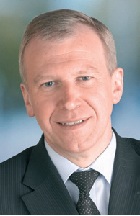Inclusive growth must be for and by the people
|
Six years after the outbreak of one of the most challenging financial, economic and social crises of modern times, the global economy is still on the path to recovery. But the signs of growth are uneven and fragile. This should not be surprising, given the intensity and the depth of the shocks that our financial systems, businesses, workers, societies and citizens have been undergoing.
In 2008, the reaction of the political leaders and policymakers was to concentrate on the most pressing needs. First, steps were taken to avoid a complete crash of the banking system. Happily, these decisions proved correct even though the policymakers had no off-the-shelf roadmap for the unprecedented crisis our governments were facing. After all, the very heart of the global financial system was in jeopardy, as severe setbacks to the economy affected the lives of millions of people worldwide.
Finally, people’s trust in our economies and institutions has been undermined. If trust is essential for economic and social interactions, it needs to be restored for a full recovery to take hold.
But how did it all go so wrong? What lessons have we learned to prevent such a crisis from occurring again? Institutions like the OECD, which admits to having failed to foresee the crisis, are now reassessing their assumptions of how our economies work. They are revisiting old concepts, developing new ideas and devising fresh approaches to deliver better policies for better lives. An essential goal for long-term prosperity is to make growth more inclusive. That means seeking to combine strong economic growth with improvements in living standards and well-being.
Inclusive growth provides equal chances and better opportunities for everyone. In the 21st century, when skills have become a global currency, this approach would encourage people to unleash their talents and willingness to work, to create, to innovate, to make the best out of their lives while simultaneously supporting those who are facing troubled times or unable to participate fully in economic and social activity. An adequate skills and education strategy is, therefore, key, as are policies aimed at producing a well balanced labour market, based on gender, equity and social cohesion. Solidarity and responsiveness will be key characteristics. The crisis has shown the lie of our former economic models, and has underlined the need to foster economic growth in a more inclusive manner.
As signs of stronger growth show through, the urgency of taking action has never been greater. Both the hesitant recovery and the persistent social crisis demand decisive policy action, to guarantee equal chances, fairer distribution of the fruits of growth, and opportunities for everyone. Looking forward, this spirit is above all an economic necessity. To thrive, our economies need all talents on board. It is also social necessity that we adopt policies that leave no one behind. And it is a political necessity restoring badly needed trust in our institutions and societies. Growth will only be sustainable in the long run if it is inclusive. Growth needs to be for and by the people. That is what inclusive growth is about.
Visit www.yvesleterme.be
See also |
Yves Leterme, Deputy Secretary-General, OECD
|
Related Documents



